- Bernard Preston homepage
- Bread
- Salt High Blood Pressure
Salt High Blood Pressure
Research into the connection between salt and high blood pressure shows many of us may have been overly-anxious about sodium.
Sodium chloride intake it would seem has been a thorn in our flesh for far too long. It is true that most of us should add rather less to our food; research shows that it would have a moderately beneficial effect on any person suffering from hypertension.
This page was last updated on 9th January, 2024.
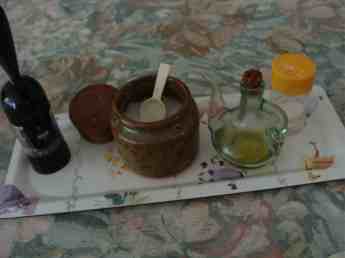
But new research from the institute of medicine claims that it is totally unscientific to insist we lower our intake below the recommended 2,3g of sodium per day; that is about one teaspoon of salt or 5 grams. In fact, it will be harmful.
But the average person enjoying typical grocery store food does consume nearly double the recommended 2300mg of sodium per day. So avoiding the really high-salt foods like packet soups, canned chicken noodle and spaghetti sauces is still on the cards.
Other common culprits are pizzas, breakfast cereals and commercial bread; cold-meat cuts, crisps and salty snacks too.
Grains that have been highly refined become utterly tasteless so we feel a need to add more salt to our noodles and spaghetti; and often spoons of sugar to our breakfast cereals.
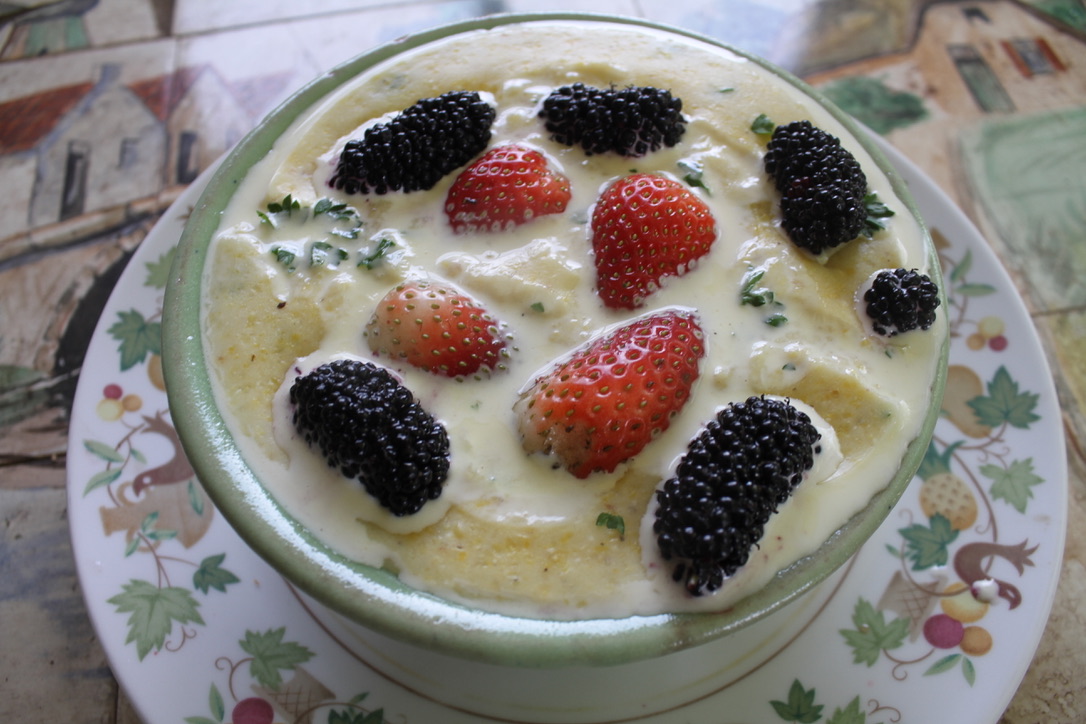 Stone-ground grits is rich in flavour and low in added salt.
Stone-ground grits is rich in flavour and low in added salt.We should cut back or avoid most of these anyway, for other reasons. Packet soups are full of chemicals; most breakfast cereals are made with ultra-refined carbohydrate and sugar.
Refined maize-meal porridge is a staple in South Africa. It has no flavour at all so folk add far too much salt and sugar; a triple whammy. It's quite different to the wholegrain stone ground grits that we enjoy frequently; with cream and fruit instead of yet more sodium.
Think rather of making your own homemade easy soup recipes. Honestly, those spaghetti sauces are nothing more than an onion, a tomato and a few herbs; and a massive amount of salt.
Few suppers can beat a homemade soup, slice of artisan bread and a glass of your favourite tipple. In this instance mulberry honey mead; you won't find that at the bottle-store.
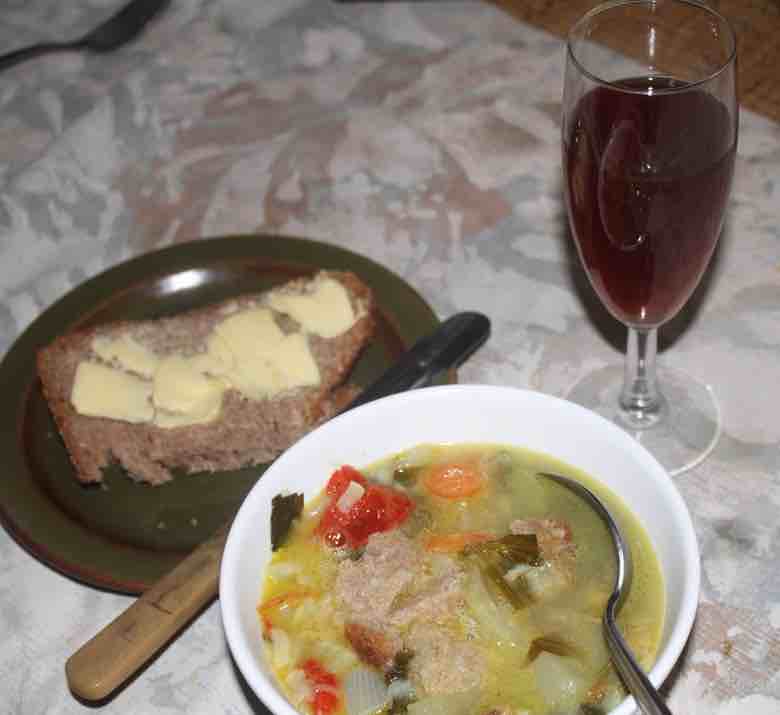
This salsa de peppadew for example is so simple to make; use whatever chilies are available. Why buy these condiments? They are expensive, loaded with salt and chemical preservatives.
Seventy-five percent of the high sodium the average person ingests is already in the packaged foods purchased at the supermarket; add more and you are seriously in trouble.
Far better is to rustle up a simple, quick relish like these fresh tomato recipes.
Apparently two-thirds of folk add salt to their food even before tasting it; that obviously is sheer silliness and I am going to test myself as well.
Commercial bread contains a lot of surplus salt and sugar too; not to mention
the refined flour. Even so-called wholewheat may have had up to 40
percent of the goodies removed, mostly the germ and bran obviously. Simultaneously those phytochemicals that give your slice its flavour are extracted; it's tasteless.
Baking your own loaf using a machine is one of the simpler ways of reducing the unwanted salt content and increasing the goodies; it takes only five minutes to prepare the dough. The extra choline in the wholegrain alone makes it worthwhile.
This salt calculator[7] will give you a rough idea of how much you consume; and whether you are within the guidelines.
"One in five South African children already has high blood pressure. The main drivers in adults are abdominal obesity, alcohol and excessive-salt intake."
- Professor Alta Schutte, President of the International Society of Hypertension.
Insulin resistance
Our bodies need sodium chloride; too little increases insulin-resistance. Great care must be taken not to overemphasize salt high blood pressure.
One cup of canned spaghetti sauce contains nearly half of your recommended daily allowance of sodium; 1100mg per serving.
To simplify matters use this formula; multiply by 2,5.
- Mass of sodium x 2.5 = grams of salt.
- 2300mg sodium x 2.5 ~ 6g salt, about 1 tsp.
Salt High Blood Pressure
Research about the connection between salt and high blood pressure reveals that if we take too little, it raises cholesterol and increases insulin-resistance.
"Breakfast cereals like corn flakes have the salinity of sea-water; bread is also stuffed with salt."
Professor Neil Poulter, Imperial medical college, London.
Top of the pops is the average pizza which has 1300mg sodium in two slices.
And canned soups at 1600mg are up there too; both have more than half a teaspoon of salt in one serving.
Make your own sourdough pizza; then you do not have to worry about salt high blood pressure.
And try a few of these easy soup recipes.
There is not a shred of evidence showing that reducing sodium intake below 2300 mg provides a better outcome.
Dr Brian Strom, chairman Institute of Medicine.
No salt recipes
What really muddies the waters is that the recommended "no salt" recipes give an unhealthy total sodium intake of less than 2000mg per day.
- Actually that increases blood cholesterol.
- It increases insulin-resistance and the spectre of metabolic syndrome.
- It raises the likelihood, if you are diabetic or have a heart condition of dying from cardiovascular disease by a massive 37 percent; this after research following a huge sample of nearly 30,000 people.
Sodium is a vital mineral in many processes in the body, not least the normal inner-ear balance mechanism. Are you suffering from vertigo or dizziness?
But if there's too much sodium in the blood then the body draws in more water to dilute it, raising our pressure. There are no symptoms but it leads unerring to catastrophic health outcomes.
Another serious consideration concerning salt and high blood pressure is that the accompanying raised cholesterol often means statins are then prescribed; and they are strongly associated with an increased risk of becoming diabetic[3].
British Medical Journal 2009
A meta-analysis of 13 studies however does indicate that high salt intake, over 3600mg of sodium is strongly associated with a raised risk of heart disease and stroke; twice as likely. That's massive.
The weakness of this study is that it compared two large groups both taking too much salt, viz 8 vs 4g of sodium. Clearly those consuming the huge amount per day were at a much higher risk of heart disease and stroke.
All things in moderation
So the old adage still holds true. Too much salt is bad.
Too little is also not good for you.
Those at risk are folk eating out regularly and who rely on industry for their soups, sauces and pizzas; TV-dinners and fast food in general. Snacks like salted peanuts every day too are a recipe for disaster.
- Ideal ~ 2300g of sodium per day.
- Above 4g - higher risk.
- Above 8g - much higher risk.
- < 1500mg - also higher risk.
Research published in the Journal American Medical Association in January 2015 again confirms that we have perhaps been overly concerned about salt intake.
A study of 2600 older folk in fine fettle, over a ten year period found no significant association between mortality and salt intake up to 2300 mg per day.
Read more at dietary sodium intake[4].
It is the whole diet that counts; and certainly those who eat out regularly may find themselves consuming far more than 2300 mg of sodium per day.
Just a can of soup contains about 1000 milligrams of sodium and two slices of supermarket bread 350 mg.
Using a bread machine to bake your own gives you control over the salt. I use 1/2 tsp which contains 1150 milligrams of sodium. One loaf makes 15 slices; 77mg each which is less than half of that from the supermarket.
This artisan bread menu recipe is dead easy but you do need a baking machine. Get one secondhand; there are plenty about since it's the most underused kitchen appliance apparently.
Bernard Preston uses his every day. It is only five minutes work to make the most delicious loaf with the best ingredients; what's known as resistant starch. It is not fattening like your supermarket bread.
Just avoid canned soups totally.
Find out more about resistant starch to get you a happy colon; and help prevent the neurodegenerative diseases like Parkinson's.
Potassium
What is even more important than sodium levels is the ratio to potassium.
Retrain the taste-buds
Tufts University research points out that salt is an acquired taste; and just as we can retrain our mouths to enjoy more fibrous, chewy food and less sugar so can we apply the same mindset to eating smaller amounts of the element.
Always taste your food before adding extra salt.
Tufts recommends embracing home cooking and eating less prepared foods; we could not agree more. It's a massive time-saver; in the future we know we will be spending far fewer hours consulting doctors for heart conditions, sitting in the chair being dialyzed and purchasing medication.
Lifestyle
Disturbing research after following 14,000 people with high blood pressure for ten years found there was no significant reduction in mortality by taking hypertensive medication; however changes of lifestyle were definitely associated with a lower risk of death.
Change of lifestyle plus the medication had the greatest benefit. They studied weight loss, smoking and physical activity; diet and sleep-duration too.
The salt high blood pressure equation would certainly have been part of the dietary changes studied.
The buzzword today is food as medicine; researchers for example have shown that type-2 diabetics can be brought completely into remission by a change of lifestyle alone without any drugs.
Choice Foods
Look rather to your own choice foods remembering that our slogan is nutritious meals, made fast. There are so many recipes now available but many of them take up hours of your life; time you probably don't have. At Bernard-Preston.com you will find simple, good advice about your nosh; with none of the salt high blood pressure worries.
And taste your food before adding any extra salt. If you are active with normal blood pressure, then do not stress out.
Foods to reduce inflammation
If you have any cardiovascular concerns, it's far more important to focus on what is causing your blood vessels to appear red and angry-looking. Foods to reduce inflammation are most likely a good deal more important than salt high blood pressure.
According to a prominent heart surgeon, the inflammation in blood vessels that he views every day has been getting much worse. He attributes this to the switch to polyunsaturate omega-6 fats like sunflower, soyabean and corn in cooking oils; and margarine.
In short return to the foods that your gran served and question the meals that your mother prepares, before fussing over salt high blood pressure. Yes, and that includes returning to butter, in moderation.
Magnificent sesame oil benefits include returning blood pressure to normal.
- Read more at foods to reduce inflammation
- Butter is back
More important perhaps is to make sure we are consuming on a daily basis those foods that enable the methylation of homocysteine, a toxic breakdown product of protein metabolism. At least four of the B group of vitamins are essential; they are folate, choline and betaine.
B12 too is especially important.
"A whole grain should consist of the bran, germ and endosperm in the same proportions as found in nature.
This study determined that choline and betaine are particularly rich in the germ and bran[1]."
Commercial bread contains too much salt and, since most of the germ and bran have been removed even in so-called wholegrain flour; it is very low in choline and betaine. The consequences for our blood vessels are devastating with resulting high blood pressure.
It is just one of the reasons we advocate milling your own flour and baking bread; the other of course is that your homemade-loaf tastes divine. Resist the temptation and allow it to cool completely before consumption for a happy tum; even the next day. It's all about retrogradation of starches[6].
Baking your own sourdough bread recipe also reduces concerns about salt and high blood pressure; the commercial loaf is usually loaded.
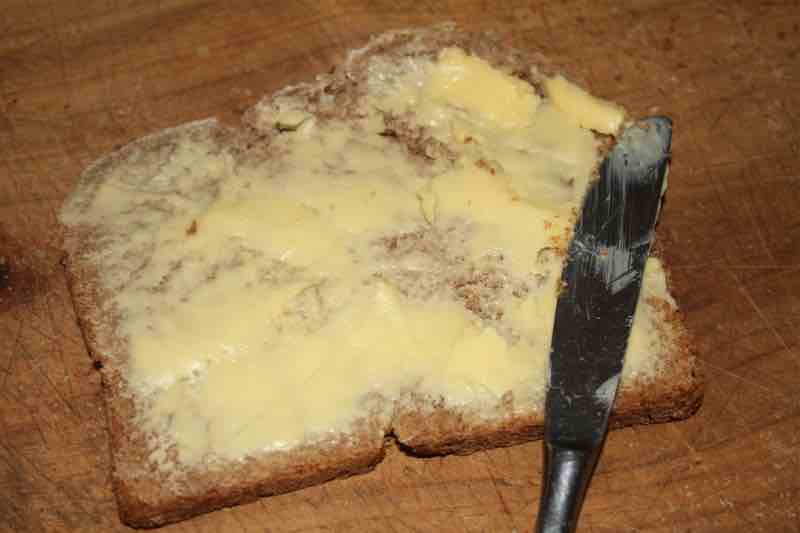
Homocysteine has been strongly associated with cardiovascular disease and senile dementia. Green leafy vegetables contain all the benefits of folate enabling the body to break down the toxic compound.
These choline food sources supply yet another vitamin necessary for the break down of homocysteine and improve the overall well-being of your colon.
It is about overpopulating and feeding the friendly microbiota in your large intestine; then the pathogens, should they attack, are outnumbered and by sheer virtue of the population are overwhelmed; that is where the nasty twisted tor proteins come from in Alzheimer's disease. Do you know about the benefits of kefir?
And have you ever considered a homemade sauerkraut recipe? Food companies cannot make it half as tasty as you can in your own kitchen. To make it palatable and safe they have to add flavour enhancers and preservatives; it is no longer a probiotic.
A high salt diet also alters the gut microbiota composition leading to a higher ratio of Firmicutes to Baceteroidetes species; this has been associated with a poorer health status, though some studies contest this.
Personally I am very suspicious of all these chemicals they add. Rather, let us turn the television off and make half an hour once a month to prepare our own homemade sauerkraut.
Are you worried about salt high blood pressure? Just eat out less often.
More recent research confirms that in ambulatory patients with heart failure, a dietary intervention to reduce sodium intake to less than 1500 mg/day did not reduce clinical events[5].
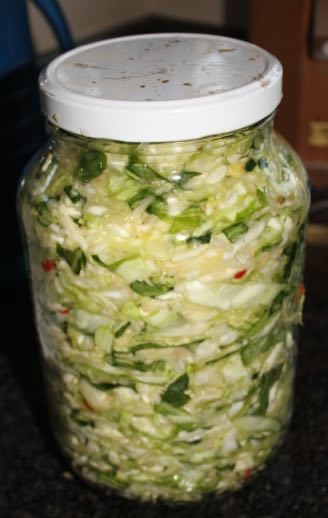
- The betaine and choline content of a whole wheat flour compared to other mill streams
- Nutritious Breakfast menu ...
- Association of statin therapy initiation and diabetes progression
- Dietary sodium intake
- Reduction of dietary sodium to less than 100 mmol in heart failure
- About resistant starch
- How to calculate your salt intake
When browsing use right click and Open Link in New Tab, or you may get a bad gateway signal.
Newsletter
Our newsletter is entitled "create a cyan zone" at your home, preserving both yourself and Mother Earth for future generations; and the family too, of course. We promise not to spam you with daily emails promoting various products. You may get an occasional nudge to buy one of my books.
Here are the back issues.
- Lifestyle and ideal body weight
- What are ultra-processed foods?
- Investing in long-term health
- Diseases from plastic exposure
- Intensive lifestyle management for obesity has limited value
- A world largely devoid of Parkinson's Disease
- The impact of friendly bacteria in the tum on the prevention of cancer
- There's a hole in the bucket
- Everyone is talking about weight loss drugs
- Pull the sweet tooth
- If you suffer from heartburn plant a susu
- Refined maize meal and stunting
- Should agriculture and industry get priority for water and electricity?
- Nature is calling
- Mill your own flour
- Bake your own sourdough bread
- Microplastics from our water
- Alternative types of water storage
- Wear your clothes out
- Comfort foods
- Create a bee-friendly environment
- Go to bed slightly hungry
- Keep bees
- Blue zone folk are religious
- Reduce plastic waste
- Family is important
- What can go in compost?
- Grow broad beans for longevity
- Harvest and store sunshine
- Blue zone exercise
- Harvest and store your rainwater
- Create a cyan zone at your home
Did you find this page interesting? How about forwarding it to a friendly book or food junkie? Better still, a social media tick would help.
- Bernard Preston homepage
- Bread
- Salt High Blood Pressure
Address:
56 Groenekloof Rd,
Hilton, KZN
South Africa
Website:
https://www.bernard-preston.com